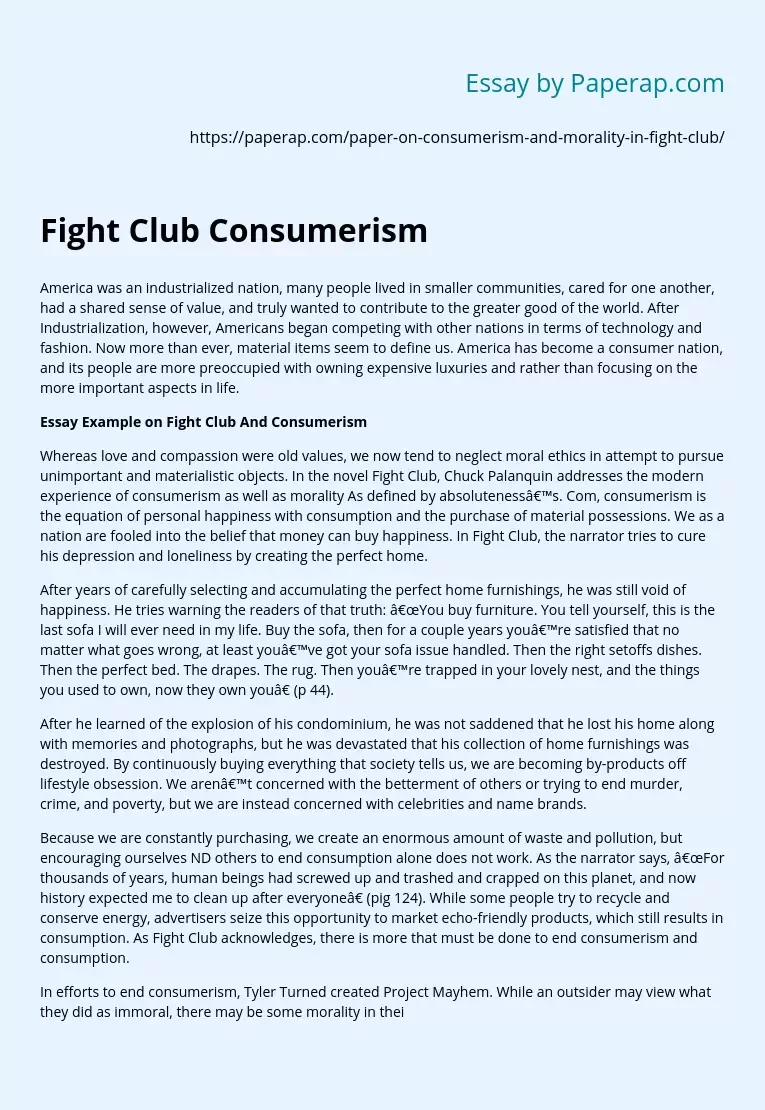Fight Club Consumerism
America was an industrialized nation, many people lived in smaller communities, cared for one another, had a shared sense of value, and truly wanted to contribute to the greater good of the world. After Industrialization, however, Americans began competing with other nations in terms of technology and fashion. Now more than ever, material items seem to define us. America has become a consumer nation, and its people are more preoccupied with owning expensive luxuries and rather than focusing on the more important aspects in life.
Essay Example on Fight Club And Consumerism
Whereas love and compassion were old values, we now tend to neglect moral ethics in attempt to pursue unimportant and materialistic objects. In the novel Fight Club, Chuck Palanquin addresses the modern experience of consumerism as well as morality As defined by absoluteness’s. Com, consumerism is the equation of personal happiness with consumption and the purchase of material possessions. We as a nation are fooled into the belief that money can buy happiness.
In Fight Club, the narrator tries to cure his depression and loneliness by creating the perfect home.
After years of carefully selecting and accumulating the perfect home furnishings, he was still void of happiness. He tries warning the readers of that truth: “You buy furniture. You tell yourself, this is the last sofa I will ever need in my life. Buy the sofa, then for a couple years you’re satisfied that no matter what goes wrong, at least you’ve got your sofa issue handled.
Then the right setoffs dishes. Then the perfect bed. The drapes. The rug. Then you’re trapped in your lovely nest, and the things you used to own, now they own you” (p 44).
After he learned of the explosion of his condominium, he was not saddened that he lost his home along with memories and photographs, but he was devastated that his collection of home furnishings was destroyed. By continuously buying everything that society tells us, we are becoming by-products off lifestyle obsession. We aren’t concerned with the betterment of others or trying to end murder, crime, and poverty, but we are instead concerned with celebrities and name brands.
Because we are constantly purchasing, we create an enormous amount of waste and pollution, but encouraging ourselves ND others to end consumption alone does not work. As the narrator says, “For thousands of years, human beings had screwed up and trashed and crapped on this planet, and now history expected me to clean up after everyone” (pig 124). While some people try to recycle and conserve energy, advertisers seize this opportunity to market echo-friendly products, which still results in consumption. As Fight Club acknowledges, there is more that must be done to end consumerism and consumption.
In efforts to end consumerism, Tyler Turned created Project Mayhem. While an outsider may view what they did as immoral, there may be some morality in their message. Project Mayhem attempted to free the world and better society by destroying what we see as Important. Although their destructiveness may be to the extreme, they do not actually have intentions of physically hurting others; they made sure that the Parker Morris building was empty prior to demolition. By destroying corporate America, teen essentially treble to make people see can toner Tort won teen were and not by what they own.
While it could be seen that Project Mayhem’s actions are a result of their skewed set of morals, there may be some understanding in the big picture of Teller’s plan. As technology and industry progresses, so will consumerism. Fight Club may be one attempt to force society to question their values and how they live their lives, but we as a nation must come together to end consumerist beliefs so that America can become the nation it was set out to be; the land where anything is possible and citizens can fully express themselves as they please.
Fight Club Consumerism. (2019, Nov 27). Retrieved from https://paperap.com/paper-on-consumerism-and-morality-in-fight-club/

